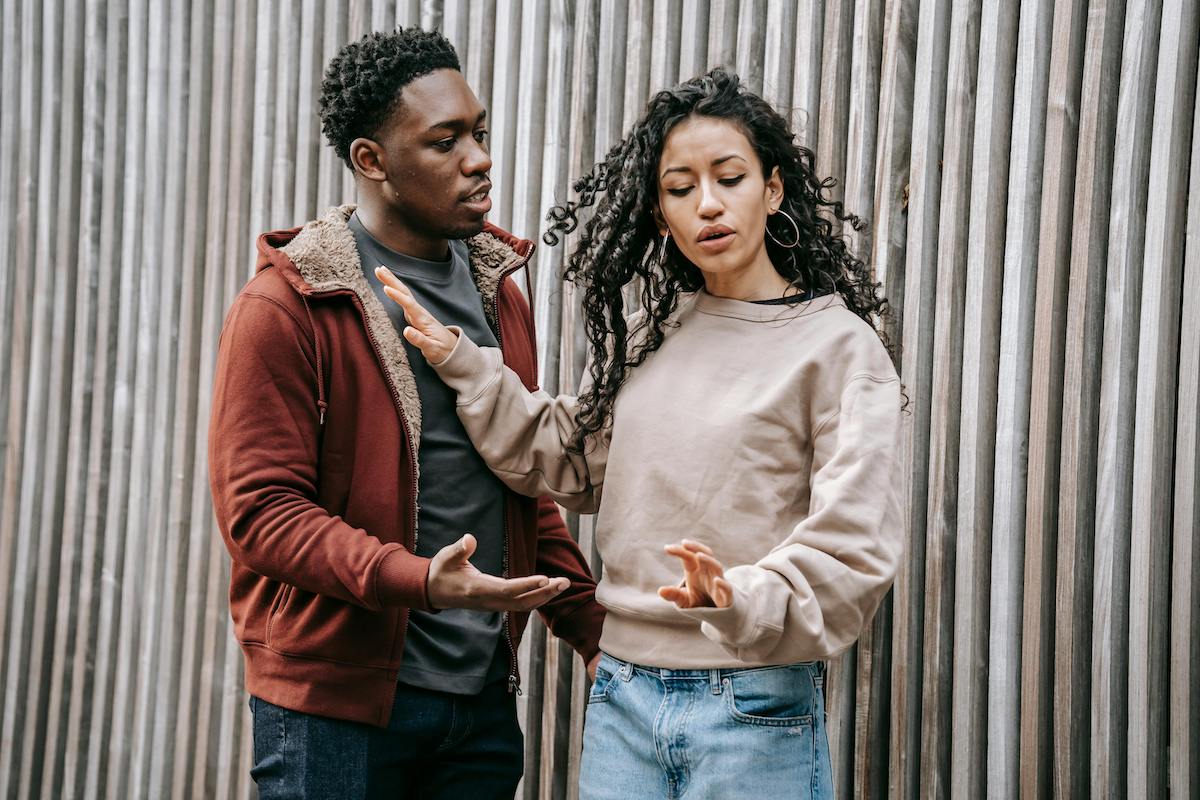Early dating is supposed to be exciting, but what happens when something feels just a little off?
It might not be obvious—Red flags in dating rarely show up as loud warnings.
They often appear in small moments: a joke that stings, a gesture that feels too fast, a pit in your stomach you can’t quite explain. Especially when you’re caught up in the excitement of a new connection, those early warning signs in a relationship can be hard to name, and even harder to trust.
But noticing red flags in early dating isn’t being paranoid. It’s about protecting your emotional safety.
Whether you’ve been burned before or you’re just trying to date more intentionally, knowing what to look for can help you choose connection from a place of clarity, not fear or self-doubt.
After spending nearly two decades as a couples therapist, I’ll share some of the most common red flags for dating that I see in my office year after year. We’ll talk through what they look like in real life, why they’re easy to miss, and how to trust your discernment when something doesn’t sit right.
What Are Red Flags in Dating?
Red flags in dating relationships are behaviors, patterns, or dynamics that signal potential harm (emotional, relational, or psychological). They’re warning signs that something may be off beneath the surface, even if everything looks fine on the outside.
Red flags aren’t always loud or dramatic. Sometimes they show up subtly—hidden behind charm, flattery, or intense attention.
They might even be flattering at first. That’s what makes them tricky.
What matters most isn’t whether a behavior is technically “wrong,” but how it makes you feel: diminished, anxious, confused, or off-center. Red flags in relationships often start small, but over time, they create patterns that become problematic.

Why We Miss Red Flags
Red flags don’t always wave in your face. More often, they slip in quietly—through a comment that stings, a pattern that feels familiar, or a moment where your gut tenses but your brain talks you out of it.
And even when they’re obvious to everyone outside of the relationship, people still overlook them.
Why? Because many of us are conditioned to doubt ourselves, to give the benefit of the doubt to the other person, or to prioritise connection over clarity.
Here’s why you might miss red flags in early dating:
The Excitement of Something New
When the chemistry is strong, perspective can get blurry. It’s easy to focus on what feels good: the connection, the compliments, the potential. Your brain wants the story to go well, and that can make it hard to admit when something doesn’t sit right.
Rose-Colored Glasses
Idealizing someone early on is normal. But when it leads you to excuse dismissive comments or inconsistent behavior, it becomes a problem. If you’re constantly rationalizing their actions with, “Maybe I’m overreacting,” it’s time to pause and check in with yourself.
The Pressure to “Not Be Too Picky”
We hear it all the time—don’t be difficult, don’t have too many standards, just give it a chance.
Especially for women and other marginalised groups, there’s often a message that asking for emotional clarity or respect is somehow “too much.” That messaging can make you second-guess instincts that were actually spot-on.
15 Red Flags to Watch for in Early Dating
Some red flags are loud and immediate. Others are quiet, building slowly over time. The key is not to tally every imperfection, but to notice how you feel in the presence of certain patterns—anxious, dismissed, unsure, or small.
These are some of the most common early warning signs of red flags in dating or beginning a new relationship that you should pay attention to:
1. They rush intimacy or commitment (a.k.a love bombing)
If someone is already talking about moving in, planning a future, or calling you “the one” early on, it may feel romantic, but it’s worth slowing down. This can be more about control than genuine connection. Sometimes, the partner (even subconsciously) wants to sweep you off your feet so you become emotionally invested before you really know them. Healthy relationships take time to build.
2. They joke at your expense
If you often laugh along but walk away feeling small, that’s not just teasing. Jokes targeting your appearance, ambitions, or emotions can slowly weaken your confidence.
So, pay attention to how often their “jokes” leave you feeling small. Someone who truly respects you will lift you up, not get laughs at your expense.
3. They don’t respect your boundaries
Boundaries aren’t optional. Whether it’s about time, space, or physical comfort, a partner who ignores or pressures you after you’ve been clear is showing you that your needs aren’t a priority.
Maybe you’ve said you’re not ready to be physical, but they constantly try to create situations specifically geared toward intimacy. Maybe you asked for space on a busy day, and they act irritated. If they guilt-trip you or consistently try to persuade you otherwise, it’s a red flag.
Respect means honoring your no, not trying to change your mind.
4. They get jealous quickly
Jealousy isn’t always obvious. It might start as subtle comments when you talk about a coworker or frustration when you go out without them. Over time, it can escalate into control — needing to know where you are, who you’re with, or why you’re not replying right away.
At its core, this jealousy is about insecurity and control, and people who can’t get past trust issues in their past often let it seep into their current relationships.
If you feel like you have to downplay your social life to keep the peace, that’s a red flag.
5. They call all their exes “crazy”
If every story about their past relationships makes them the victim and paints their exes as unstable, irrational, or “crazy,” proceed with caution.
It’s a major red flag when someone can’t take any responsibility for what went wrong.
This kind of talk not only lacks accountability, but it also raises the question: how will they talk about you if things don’t work out?
Relationships are complex, and a healthy person can reflect on the part they played—learning this and applying it is actually one of the main benefits of going to therapy.
6. They check in constantly
Frequent texts and calls can initially feel flattering— “just checking in” or “miss you already.”
But it’s worth paying attention if you start to feel smothered, monitored, or guilty for not replying quickly. Constant check-ins often stem from insecurity or control, not genuine care.
It can become a way to track your movements, test your availability, or make sure you’re prioritizing them. Healthy partners give each other space to be individuals without guilt or suspicion, in a healthy relationship.
7. They get angry or withdraw when you disagree
Disagreement is part of getting to know someone, so if your partner regularly shuts down, lashes out, or punishes you with silence every time you express a different opinion, that’s a red flag that the relationship could become emotionally unsafe.
A relationship should leave room for honest dialogue, not emotional landmines.
8. They isolate you from your support system
This doesn’t always look like overt control. It might start as subtle guilt trips when you make plans, criticism of your friends, or comments like “I’m the only one who really understands you.”
Over time, this kind of emotional isolation can shrink your world. A healthy partner will want to be part of your support system, not replace it. If your connections are slowly fading, take that seriously.
9. Their words and actions don’t match
It’s easy to say the right things—promising commitment, consistency, and painting a beautiful picture of the future.
But if they regularly cancel, forget, or disregard your needs, those words don’t mean much.
Love isn’t built on charisma or poetic texts. It’s built on reliability, accountability, and follow-through.

10. They never initiate
If you’re always the one texting first, making plans, or checking in, it’s worth asking why.
A one-sided relationship in the early stages rarely becomes more balanced over time.
If they’re content to let you carry the emotional weight, it may be less about mutual connection and more about convenience.
11. They avoid serious conversations
It’s okay to take your time getting to know each other. But if every attempt to talk about boundaries, feelings, or where things are going gets brushed off, that’s not just a communication issue. It’s a sign of emotional unavailability. Someone who wants a real relationship will be open to honest conversations.
12. They use guilt to influence your choices
Emotional manipulation can sound like “If you really cared, you would…” or “I guess I’ll just be alone then.” When someone makes you feel responsible for their emotions—or guilty for holding a boundary—that’s not love. That’s control. You shouldn’t have to compromise your comfort to protect someone else’s mood.
13. They expect you to manage their emotional state
Support is part of any relationship, but you are not their therapist, their parent, or their sole source of joy.
If they rely on you for all their emotional regulation—or make you feel guilty when you can’t fix things for them—that’s a red flag. Caring doesn’t mean carrying everything alone.
14. They pressure you into physical intimacy
You deserve to feel safe and respected when it comes to intimacy. If someone pushes, pressures, or guilt-trips you into moving faster than you’re comfortable with, that’s not affection. That’s a violation. Anyone who truly values you will honor your pace without question.
15. You feel more anxious than calm
Sometimes, the biggest red flag isn’t in what they do—it’s in how you feel. If you leave dates second-guessing yourself, or feel a tightness in your chest when their name shows up on your phone, don’t ignore that. Healthy relationships bring clarity, not confusion. They leave you feeling calm, not constantly on edge.

FAQs
What are some subtle red flags most people miss?
Some red flags in dating aren’t obvious. You might notice them in tone, timing, or the way you feel afterward. Here are a few that often slip under the radar:
- Flirting with other people but calling it a joke
- Constant compliments that feel performative rather than genuine
- Dismissing your feelings when you’re upset
- Saying “you’re too sensitive” instead of listening
- Always playing the victim when conflict arises
If you regularly question your reactions or downplay your discomfort, take a closer look at the pattern, not just the moment.
Can red flags appear later in a relationship?
Yes. Not all red flags show up early. Some red flags surface only after emotional investment grows, or when you face conflict, change, or increased commitment. That’s why it’s important to keep checking in with yourself, even months into dating. If something starts to feel different, trust yourself enough to explore it.
Are red flags ever fixable?
Sometimes. With genuine self-awareness, professional support, and a willingness to change, certain patterns can shift. But this work has to come from the person showing the behavior, not from your desire to make the relationship work. If they’re not actively engaged in change, you can’t do the healing for them.
How do I know I’m not the red flag?
That’s an important question—and asking it is actually a healthy sign. If you’re reflecting on your own patterns, open to feedback, and willing to take responsibility for your impact, you’re doing the work. Red flags in relationships usually come from people who avoid accountability, not those who seek it.
A good couples therapist can also help you determine your own part in relationship issues.
Final Thoughts
You don’t need a long list of reasons to step away from someone who doesn’t feel right.
Red flags in dating aren’t about being judgmental or expecting perfection. They’re about paying attention to the patterns that affect your peace, your confidence, and your emotional safety.
Sometimes the clearest sign isn’t what they do—it’s how you feel around them.
Trust your instincts. If something feels off, it’s worth slowing down to explore it. You’re not being too picky. You’re being self-aware.
And if you need time to sort out what you’re noticing, that’s okay too. Clarity doesn’t always come quickly, but it does come when you keep listening to yourself.
You deserve a relationship that feels safe, steady, and real. Nothing less.
And if you’re still unsure whether to walk away or work things through, it might be time to consider going to couples therapy (even if you go by yourself).
